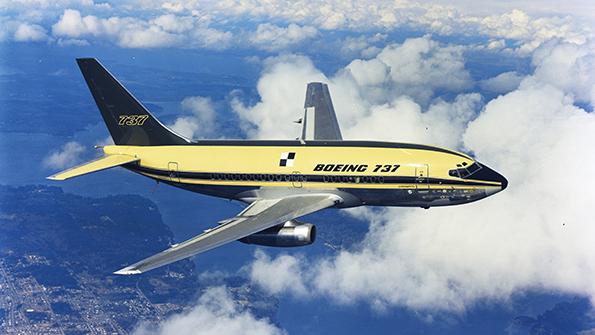This article is published in Aviation Week & Space Technology, part of Aviation Week Intelligence Network (AWIN), and is complimentary through Jan 20, 2024. For information on becoming an AWIN Member to access more content like this, click here.

Lufthansa was the launch customer for the 737-100, which made its first flight (pictured) in 1967 and entered service with the airline in 1968.
Before Lufthansa finally signed an order for the Boeing 737-100 in early 1965, Boeing had to guarantee the airline that it would not cancel the program. Three years later, the 737 entered service with the German airline. Now, 58 years after its first order and 28 years after it last bought the type, Lufthansa is coming back to the aircraft.
The airline’s supervisory board on Dec. 19 approved of a firm order for 40 737 MAXs that could grow to 100 aircraft, including options. While Lufthansa has the flexibility to change to other versions closer to their delivery dates, the group’s priority is the 737-8. The carrier also ordered 40 Airbus A220-300s plus 20 options and secured 40 options for more A320neos. Deliveries are planned to start in 2026 and continue through 2032.
- Aircraft likely to be flown by subsidiaries
- The move should help negotiate pricing
“With today’s aircraft order, we are accelerating the largest fleet modernization in our company’s history,” says Detlef Kayser, an executive board member responsible for fleet and technology. “This increases our order list of around 200 aircraft to 280—plus an additional 120 purchasing options for further state-of-the-art short- and medium-haul aircraft. We are pleased that both Airbus and Boeing were able to convince us on all commercial and technological aspects. In addition to this, the decision for the Boeing 737-8 will also give us more flexibility for the procurement of short- and medium-haul aircraft in the future.”
“Our relationship with the Lufthansa Group has led to a number of industry-changing achievements, and we are delighted to see the 737 return to an original launch customer’s fleet,” Boeing Commercial Airplanes CEO Stan Deal says.
Lufthansa bought its last 737-300 in 1995, after having ordered a total of 146 since the aircraft’s launch. The airline never went for the 737 Next Generation (737NG) and has so far stayed away from the 737 MAX. Its last 737-300 was retired in 2016. The group has since become an all-Airbus narrowbody operator across its various subsidiaries: Lufthansa, Swiss, Austrian Airlines, Brussels Airlines and Eurowings. ITA Airways, in which Lufthansa is seeking to acquire a 41% stake, is also an all-Airbus airline. SunExpress, a leisure carrier jointly owned with Turkish Airlines, is operating a mixed 737NG and MAX fleet and purchased a further 90 737 MAXs at the Dubai Airshow in November.
According to company sources, one major factor in the decision was for Lufthansa Group to become less dependent on Airbus as a sole-source supplier of narrowbodies. In future campaigns, Lufthansa can now more credibly stage competitions between the A320neo and 737 MAX and likely achieve better pricing. Airbus narrowbody slots are sold out until 2030, and the aircraft-maker currently has little incentive for big discounts unless a strategic customer needs to be retained at all costs.
Unlike its narrowbodies, Boeing’s widebodies have significant exposure at Lufthansa Group. Swiss operates Boeing 777-300ERs. Austrian’s long-haul fleet consists of Boeing 767s and 777s. Lufthansa Airlines is one of the few operators of the Boeing 747-8 and has also begun introducing the Boeing 787-9. Lufthansa Cargo operates an all-777F fleet. And Lufthansa was part of the launching customer group for the 777-9, the first of which is now expected to arrive in mid-2025.
Through November, Boeing had received firm orders for 686 737 MAXs this year. In the same period, Airbus sold 1,248 A320neo-family aircraft, showing how much of a prestige win Lufthansa’s order must be for Boeing.
It is still unclear which of the group’s airlines will operate the new 737s, although they will not be deployed to the main brand serving the Munich and Frank-furt hubs nor to Swiss in Zurich. The MAXs could end up being operated at Eurowings, Austrian or Brussels Airlines given the size of the order. Lufthansa says the decision will be made at a later stage. Eurowings has a fleet of about 100 aircraft and could move over to the MAX if all options are exercised.
The 40 A220-300s Lufthansa ordered are slated for its new City Airlines affiliate. Swiss is the only A220 operator in the group, with nine -100s and 21 -300s in service. ITA Airways committed to 22 of the aircraft, with seven coming from Airbus and 15 sourced through Air Lease Corp. Delta Air Lines is by far the aircraft’s largest customer with orders for 131, followed by JetBlue Airways with 100 units. AirBaltic and Breeze Airways have bought 80 aircraft each, and Air France and Air Canada have committed to 60 each.
The Lufthansa A220 deal is a particular blow for Embraer, which had pitched the E2 in the competition against the A220.
City Airlines is planned to start operating feeder services at the Frankfurt and Munich hubs beginning with ex-Lufthansa A319s in 2024. The new affiliate was set up because an agreement allowing the group’s existing regional airline, Lufthansa CityLine, to operate larger mainline aircraft expires in 2027.
The group operates Mitsubishi CRJ-900s and Embraer 190 and 195s at CityLine, Air Dolomiti and Austrian but says it has no plans to buy new aircraft to replace them.





